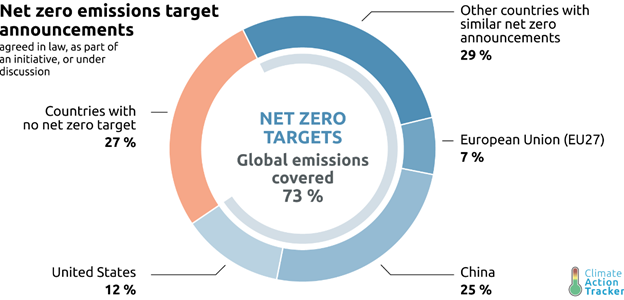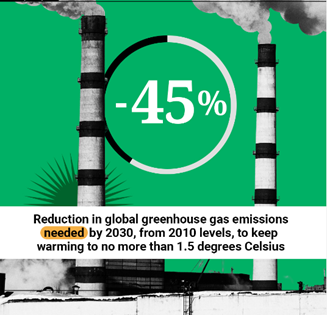Net Zero: Materiality and Morality in Harmony
Relevance
- GS Paper 3 Conservation, Environmental Pollution and Degradation, Environmental Impact Assessment.
- Tags: #NetZeroby2050 #ClimateChange #MintEditorial #UPSCMains2024.
Why in the News?
Ed Conway’s book, “The Material World,” raises crucial questions about the environmental and economic costs of achieving Net Zero goals. While addressing climate change is essential, it requires a balanced consideration of the material and moral dimensions, acknowledging trade-offs and real-world challenges.
Bringing the Secret World of Materials to Light
- In Ed Conway’s enlightening book, “The Material World,” he uncovers a realm often overlooked by most of us.
- It’s a world of raw materials powering our everyday lives.
- Conway’s journey takes us to the far corners of the Earth, revealing the energy spent extracting, molding, and incorporating these materials into our gadgets.
- He highlights a surprising fact – even green technologies like wind turbines and solar panels depend on fossil fuels for mass production.
- Furthermore, we’re on track to mine more copper in the next 22 years than in the past 5,000 years.
- Conway’s book sheds light on the invisible, yet critical, materials shaping our world.
Balancing Morality and Economics in Climate Change
- Ed Conway’s work challenges our tendency to avoid tough questions about climate change.
- While we view it as a moral duty, it’s also an economic necessity.
- Striking a balance between morality and economics becomes vital in addressing the pressing issue of climate change.
Ed Conway’s Thought-Provoking Approach to Climate Policy
- Ed Conway challenges readers to confront policymakers’ choices on global warming, emphasizing the real-world trade-offs people face.
- For instance, is it eco-friendly to scrap old cars for new ones to meet emissions mandates, but it also consumes substantial energy during manufacturing, considering the energy used to make new vehicles?
- Conway encourages us to view climate change and energy transition from an economic standpoint, bridging the gap between idealism and practicality often ignored by climate advocates.
Net Zero’s Unprecedented Challenge
- Ed Conway highlights the immense challenge of achieving ‘Net Zero’ emissions by 2050.
- Previous energy transitions occurred gradually over centuries, while today’s efforts demand swift sacrifices from current generations for future benefits.
- Recent decisions by the UK and Germany to adjust their plans for phasing out fossil-fueled cars and boilers reflect the practical difficulties of achieving rapid transitions.
- Germany initially aimed for new boilers to be 65% renewable-powered by January 2024 but had to reconsider its ambitious goals.
Obstacles in transitioning to cleaner energy sources
First – Balancing Cost of Living and Climate Goals
- Gideon Rachman noted that Public support for Net Zero policies fell when they led to higher household bills, especially in Britain and Europe.
- People often prioritize the cost of living over climate goals.
- A protester during France’s Yellow Vest movement in 2018 illustrated this, highlighting that many are more concerned about making ends meet each week than distant climate concerns.
- Balancing affordability with environmental objectives is a complex challenge.
Second – Hidden Environmental Costs of Renewable Energy
- Transitioning to renewable energy for Net Zero goals often overlooks the environmental costs.
- Proper disposal of materials like wind turbine blades and solar panels is a challenge.
- A Bloomberg article in March 2022 highlighted issues faced during Jeju Island’s Net Zero transition.
- Even though it seemed ideal, the transition was far from easy.
- In February 2023, Bloomberg reported environmental damage in the Amazon River Basin due to mining metals for electric vehicles.
- Indonesia’s biodiversity is also at risk from Nickel extraction.
- These hidden costs pose challenges to the seemingly green transition to Net Zero.
Third – Rethinking Private Capital
- Relying solely on private money for energy transition and fighting climate change is flawed.
- Private interests often prioritize profit over environmental concerns, conflicting with climate goals.
- Ed Conway’s examples show how corporate greed can overshadow the noble intentions of climate policies, jeopardizing our efforts to protect nature and combat climate change.
Fourth – Geopolitical Risks in Climate Goals
- Overreliance on one country for materials like steel, copper, and silicon chips poses geopolitical risks in achieving Net Zero goals.
- Dominance by a single nation makes these materials susceptible to weaponization, impacting climate efforts.
- Recent events on 7 October emphasize ongoing geopolitical risks as we strive for Net Zero by 2050, presenting challenges on the path to sustainability.
Balancing Act in Policy
- Some economists get that when making policies, you often have to make choices.
- But those who think there’s a perfect, one-size-fits-all solution might not see this.
- Or maybe they think any problems can be pushed onto the people who can’t speak up, whether they’re from rich or poor countries.
Balancing Climate Realities and Other Priorities
- Ignoring the costs and refusing to acknowledge trade-offs in climate policies is unreasonable.
- Denying people a decent life for the sake of maintaining a certain lifestyle is both undemocratic and manipulative.
- Fear-based persuasion, as seen during the pandemic, isn’t the only approach.
We must address climate change realistically, considering the diverse priorities of billions. As Abraham Lincoln emphasized, “Public sentiment plays a vital role; finding a balanced path is key to success.”
|
Net Zero: A Global Climate Goal What is Net Zero?
Importance of Net Zero
Achieving Net Zero
Global Efforts Towards Net Zero
Turning Commitments into Action
Progress Towards 2050 Goal
|
Source: Livemint
Mains Question
Evaluate the ethical and moral aspects of climate policies, particularly in the context of global equity and the impact on marginalized populations. How can policymakers address these ethical concerns in their decision-making process?





